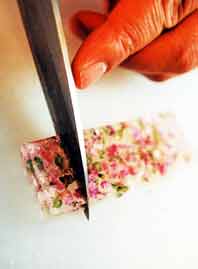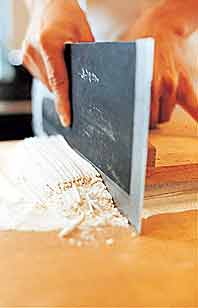Basic Kitchen Safety
Knife Safety
- Keep knives sharp. A sharp knife will slide easily through what you are cutting, with little force needed. If the knife is dull, you have to force it and if you slip there is real danger of cuts.
- Point away. When you are using a knife, always cut with the blade of the knife angled away from you. Never angle the knife toward you or your fingers.
- Always use a cutting board. Place a damp towel or paper towel beneath the cutting board to keep it from moving around the countertop. Make sure your cutting board has ample space for the task. Never cut anything held in your hand.
- Put knives down safely. When working with a knife, and you lay it down, set it down with the blade laying flat, never pointing up. Make sure to set it away from the surface edge and pointing away from you.
- Wash and store knives safely. Hand-wash your knives and dry thoroughly. Never put knives into the dishwasher or drop them into a sink filled with sudsy water. Always hold a knife by its handle, never the blade.
Fire and Hot Oil Safety in the Kitchen
- Protect Against Fires. Most kitchen fires start because of over heating fat or oil. Oil starts to smoke as it gets hot; if it gets too hot it can burst into flame. To extinguish a fat fire cover it with a fire blanket or damp cloth and turn off the gas or power. You can use foam of powder extinguishers but NEVER use water. Do not try to carry the burning pan! Never leave heating oil unattended.
- No Liquid in Hot Oil! Never put water or other liquid into hot cooking oil as it turns into steam instantly, and can violently explode hot oil in many directions. Be careful to ensure that food is fully dry (or defrosted if previously frozen) before placing it in hot oil, as water content will make the hot oil explode in many directions. Do not forget to cut off the end of the shrimp tail when you make shrimp tempura because sometimes moisture forms inside the tail section.
- Be Careful! Use caution when standing or walking near pan as splattered oil may have created a slick surface. After food is cooked, turn off the heat and remove food.
Fresh Ingredients
- Sanitation and cleanliness are essential to the cooking process. Therefore, when it comes to the choice of ingredients, always choose the freshest ingredients available. If any ingredients are not used immediately, keep them at a proper temperature and refrigerate where needed. These guidelines are especially important when using foods and ingredients that are eaten raw such as fish and vegetables. In addition, always try to serve the dish immediately after its preparation.
Special Safety Tips for Stone-Broiling (Lesson 9)
- Use the utmost care in this process. In Japan, there are certain stones which are ideal for this cooking method that are actually sold in some Japanese tableware stores. However, there is a possibility with any stone that it may crack or splinter after being heated. So please take care as this could cause injury. Also, be extremely careful handling heated stones as their high temperature is not immediately apparent. Make sure your guests are aware of the danger of the heated stone and that they take appropriate care.
General Safety Tips
- Always remember that the steam will rise out of a boiling pot of water or a steamer when you take off the cover. Remove the cover far side first so that this steam does not scald your hand or face.
- For sanitation and cleanliness purposes, it is a necessity to use separate cutting boards for different tasks, especially for the cleaning of fish and the preparation of meat. The utensils used for these tasks, including cutting boards, kitchen knives, and cloths need to be thoroughly washed and disinfected after each use.
- Don't let the pan handles on the stove stick out over the floor. They can catch on clothing and spill. Turn them to the side, but don't let them extend over adjacent burners.
- Hot oil or water can cause severe burns and permanent disfigurement; use caution and common sense when using this product.
- Smoking oil is an indication that the oil is too hot and may ignite. Reduce flame immediately to avoid igniting the oil.
- To move a pan, always wear oven mitts or gloves to protect your hands from burns.

